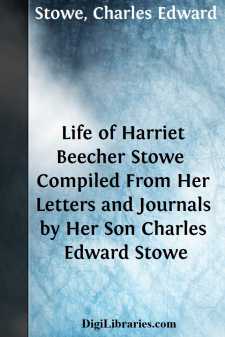Categories
- Antiques & Collectibles 13
- Architecture 36
- Art 48
- Bibles 22
- Biography & Autobiography 813
- Body, Mind & Spirit 142
- Business & Economics 28
- Children's Books 17
- Children's Fiction 14
- Computers 4
- Cooking 94
- Crafts & Hobbies 4
- Drama 346
- Education 46
- Family & Relationships 57
- Fiction 11829
- Games 19
- Gardening 17
- Health & Fitness 34
- History 1377
- House & Home 1
- Humor 147
- Juvenile Fiction 1873
- Juvenile Nonfiction 202
- Language Arts & Disciplines 88
- Law 16
- Literary Collections 686
- Literary Criticism 179
- Mathematics 13
- Medical 41
- Music 40
- Nature 179
- Non-Classifiable 1768
- Performing Arts 7
- Periodicals 1453
- Philosophy 64
- Photography 2
- Poetry 896
- Political Science 203
- Psychology 42
- Reference 154
- Religion 513
- Science 126
- Self-Help 84
- Social Science 81
- Sports & Recreation 34
- Study Aids 3
- Technology & Engineering 59
- Transportation 23
- Travel 463
- True Crime 29
Life of Harriet Beecher Stowe Compiled From Her Letters and Journals by Her Son Charles Edward Stowe
Categories:
Description:
Excerpt
Harriet Beecher (Stowe) was born June 14, 1811, in the characteristic New England town of Litchfield, Conn. Her father was the Rev. Dr. Lyman Beecher, a distinguished Calvinistic divine, her mother Roxanna Foote, his first wife. The little new-comer was ushered into a household of happy, healthy children, and found five brothers and sisters awaiting her. The eldest was Catherine, born September 6, 1800. Following her were two sturdy boys, William and Edward; then came Mary, then George, and at last Harriet. Another little Harriet born three years before had died when only one month old, and the fourth daughter was named, in memory of this sister, Harriet Elizabeth Beecher. Just two years after Harriet was born, in the same month, another brother, Henry Ward, was welcomed to the family circle, and after him came Charles, the last of Roxanna Beecher's children.
The first memorable incident of Harriet's life was the death of her mother, which occurred when she was four years old, and which ever afterwards remained with her as the tenderest, saddest, and most sacred memory of her childhood. Mrs. Stowe's recollections of her mother are found in a letter to her brother Charles, afterwards published in the "Autobiography and Correspondence of Lyman Beecher." She says:—
"I was between three and four years of age when our mother died, and my personal recollections of her are therefore but few. But the deep interest and veneration that she inspired in all who knew her were such that during all my childhood I was constantly hearing her spoken of, and from one friend or another some incident or anecdote of her life was constantly being impressed upon me.
"Mother was one of those strong, restful, yet widely sympathetic natures in whom all around seemed to find comfort and repose. The communion between her and my father was a peculiar one. It was an intimacy throughout the whole range of their being. There was no human mind in whose decisions he had greater confidence. Both intellectually and morally he regarded her as the better and stronger portion of himself, and I remember hearing him say that after her death his first sensation was a sort of terror, like that of a child suddenly shut out alone in the dark.
"In my own childhood only two incidents of my mother twinkle like rays through the darkness. One was of our all running and dancing out before her from the nursery to the sitting-room one Sabbath morning, and her pleasant voice saying after us, 'Remember the Sabbath day to keep it holy, children.'
"Another remembrance is this: mother was an enthusiastic horticulturist in all the small ways that limited means allowed. Her brother John in New York had just sent her a small parcel of fine tulip-bulbs. I remember rummaging these out of an obscure corner of the nursery one day when she was gone out, and being strongly seized with the idea that they were good to eat, using all the little English I then possessed to persuade my brothers that these were onions such as grown people ate and would be very nice for us. So we fell to and devoured the whole, and I recollect being somewhat disappointed in the odd sweetish taste, and thinking that onions were not so nice as I had supposed. Then mother's serene face appeared at the nursery door and we all ran towards her, telling with one voice of our discovery and achievement. We had found a bag of onions and had eaten them all up.
"Also I remember that there was not even a momentary expression of impatience, but that she sat down and said, 'My dear children, what you have done makes mamma very sorry. Those were not onions but roots of beautiful flowers, and if you had let them alone we should have next summer in the garden great beautiful red and yellow flowers such as you never saw.' I remember how drooping and dispirited we all grew at this picture, and how sadly we regarded the empty paper bag....


